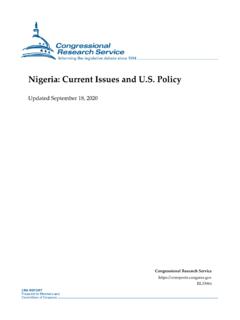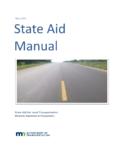Transcription of Bring Character Education into Classroom
1 Fgjkl International Journal of Environmental & Science Education V o l . 3 , N o . 3 , J u l y 2 0 0 8 , xx-xx Bring Character Education into Classroom Alex Agboola1, Kaun Chen Tsai2 1 University of the Incarnate Word 2 University of the Incarnate Word, 6900 N Vandiver Rd J205, San Antonio, TX, 78209, USA E-mail: Character Education is a growing discipline with the deliberate attempt to optimize students ethical behav-ior. The outcome of Character Education has always been encouraging, solidly, and continually preparing the leaders of tomorrow.
2 The promotion of Character Education should not just a leap service but has an action plan for practice. In order words, Education policy should take the lead to actualize moral Education . Taken together, parents, teachers, and administrators as stakeholders, should join this camp to encourage students to manifest those good values in their lives. The outline of this paper is that first the definition of Character Education is provided. Then, the historical perspective of Character Education is reviewed. Third, the issue of context in Character Education is disclosed.
3 The challenge and controversy of implementation of Character Education is also presented. Finally, the implication and further research are discussed. Key words: Character Education , characters, virtues, moral Education Introduction Character has from the time immemorial been perceived as a word that is acclaimed with special connotations. In other words, when someone is attributed as having a good Character as it is commonly used, that person also possesses some other qualities such as trustworthiness, integrity, passionate, reliable, and dependable (Pike, 2010).
4 According to developmental psychologist Diana Baumrind (as cited in Berkowitz & Fekula, 2006), Character as the measurement of our perceived manners; namely, it is an overall evaluation of our inward and outward behaviors. Character Education is a growing discipline with the deliberate attempt to optimize students ethical behavior (Berkowitz & Hoppe, 2009; Katilmis, Eksi, & zt rk, 2011). Character Education is not a new idea. The idea of schooling as implanting virtues is as old as schooling itself (O'Sullivan, 2004). Initially Character Education was an imperative mission in the public educational system; nevertheless, because of fear of conceptual interconnection between morality and religion, it was phased out (Cooley, 2008; Skaggs & Bodenhorn, 2006).
5 The main principle of good Character is respect, truth, fair, and responsibility (Skaggs & Bodenhorn, 2006). Education , in its own domain, has been the part and parcel of our individual lives even from the inception of our respective lives. No wonder it is being described as field of action in its own right (Hogan, 2006, p. 253). This is the practical aspect of Education as those actions have in retrospect been accorded to us when we were growing up. John Wilson said that Education should be seen as a tool of various authorities like a huge corporation, institutional settings research institutes/universities, or better yet, that of a country (as cited in Hogan, 2006).
6 Attention on the Character Education has growing in a public school system because of the increasing tendency of negative behaviors among youth (Wil-liams, Yanchar, Jensen, & Lewis, 2003). Character Education can become an everyday opportunities (Milliren & Messer, 2009, p. 20). Further, Cooley (2008) prized Character Education as engines of social change ( ). EUROPEAN JOURNAL OF EDUCATIONAL RESEARCH Vol. 1, No. 2, 163-170 ISSN 2165-8714 Copyright 2012 EUJER 164 Agboola & Tsai 2012, European Journal of Educational Research, 1(1), 163-170 For the purpose of this literature review, first the definition of Character Education is provided.
7 Then, the historical perspective of Character Education is reviewed. Third, the issue of context in cha-racter Education is disclosed. The challenge and controversy of implementation of Character Education is also presented. Finally, the implication and further research are discussed. Character Education Defined Right from a very long time, the educational systems of world spectrum had in many forms initiated some systems of educating pupils of different ages, and creed about the values of Character . It is believed that whatever the children become in the future has to do with the level of Character imbedded in him, or her, through Education .
8 The belief systems in different parts of the worlds and the inability to maintain a standard accepted ways of instilling this concept of Education ( , the disagreement between parents and schools) have made the program of Character Education even subtle. However, as ethical thinking is progressively being incorporated into various levels of Education or training, the world is gradually embracing the values that come with Character Education (Tirri, 2009, p. 118). The word Character in ancient Greek means to engrave, which emphasizes the engraved traits will affect us to behave in certain manners (O'Sullivan, 2004).
9 Good Character is a concept which contains knowing good, embracing good and doing well (Katilmis et al., 2011, p. 854). The common belief of Character Education is from psychological and philosophical perspective that virtues can be taught and learned through the proper pedagogy (Cooley, 2008). Hoge (2002) defined Character Education as a way of adjusting the behaviors of the students, in order to become good citizens of the future. According to Pike (2010), these students were being instructed, guided, and toward having some sets of prescribed behaviors.
10 Marshall, Caldwell, and Fos-ter (2011) claimed that Character Education is perpetually believed, to some kind of ways through which the students are being nurtured in the direction of seeing things in different perspectives; in other words, training them is always to exert maturity while in the mist of challenging situations. Department of Education (2005) clearly defined the Character Education as an explicit learning process from which students in a school community understand, accept, and act on ethical values such as respect for others, justice, civic virtue and citizenship, and responsibility for self and others.














